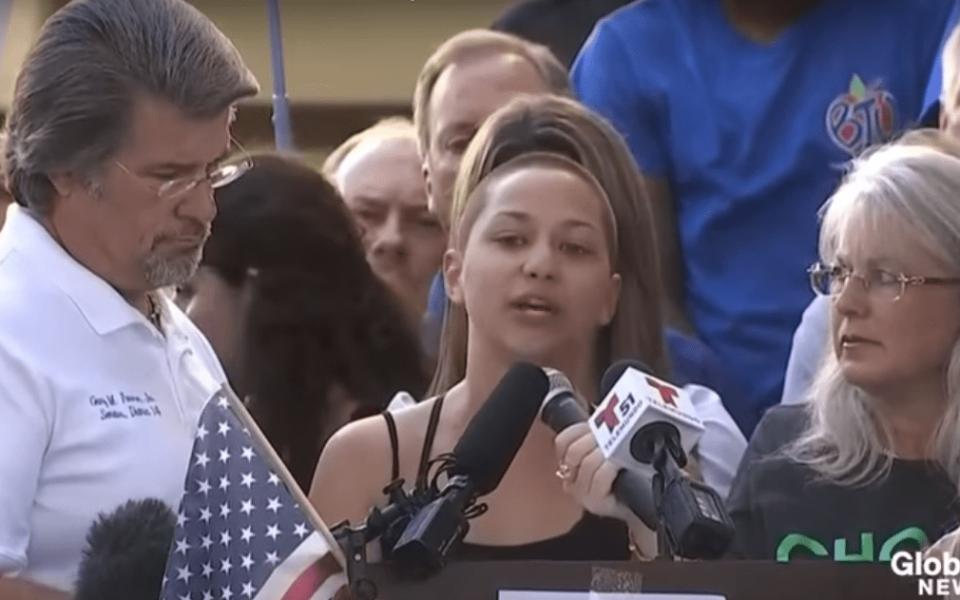The students at Marjory Stoneman Douglas High School have demonstrated true courage and resolve.
“All these people should be at home grieving, but instead we are up here standing together because if all our government and president can do is send thoughts and prayers, then it’s time for victims to be the change that we need to seek,” senior Emma Gonzalez said during a rally in Fort Lauderdale, Fla. on Feb. 17.
“Our neighbors will not have to go through other school-shooter drills when we have had our say with the government,” Gonzalez continued. “And maybe the adults have gotten used to saying, ‘It is what it is,’ but if us students have learned anything, it’s that if you don’t study you will fail, and in this case if you actively do nothing, people will continually end up dead, so it’s time to start doing something.”
As her classmates chanted, “Shame on you,” Gonzalez lit into a political establishment corrupted by a flood of campaign contributions from the National Rifle Association.
“The people in the government who are voted into office are lying to us, and us kids seem to be the only ones who notice and are prepared to call BS,” Gonzalez said. “Politicians who sit in their gilded House and Senate seats funded by the NRA telling us nothing could have ever been done to prevent this, we call BS. They say that tougher gun laws do not prevent violence. We call BS. They say a good guy with a gun stops a bad guy with a gun. We call BS.”
It has become trite to call elected officials cowardly, incompetent and weak. And while all those adjectives apply, taking shots at political opponents seems like part of the pattern of polarization and paralysis. So, let’s just take a moment to lift up heroes. They are, of course, the students who decided to organize and fight back instead of holding another candlelight vigil, who finally shamed the GOP’s constant admonitions after every massacre that it’s too soon for a debate about gun control with the simple retort: No, it was too late.
As one of the adults, I’ve come to the shameful conclusion that I have become part of the problem. When the news of the massacre broke on Feb. 14, I paid hardly any attention to the details — the death toll, the location, the gunman’s biographical sketch. The schools, churches, movie theaters that provide the setting have become an almost interchangeable litany of gore. I had succumbed to a fatalism born of the factual evidence but deficient in the most necessary element of human spirit — a hope sustained by the conviction that society is capable of change. The evidence suggests that the United States is a nation that does not care if its children are slaughtered. Nothing will be done about this, I thought, and as certain as clockwork more massacres will predictably follow.
Those insights are not wrong, but if that’s the end of the story, then such sentiments easily drift into a kind of indifference that can only be described as evil.
We must do something. Mental health and ideological motivation, including white supremacy and Islamic extremism, don’t measure up as primary causal factors. Guns are the problem. Specifically, the problem is the ease with which young men can access high-powered firearms and carry them into places where large numbers of people congregate.
There is no easy prescription for gun reform, no one technical fix. And people need to own up to this hard reckoning: Any progress will be forged from compromise that will be difficult for both the left and the right to swallow. Although the two are intertwined, guns run a close second to race as a fundamental issue that divides the country, sometimes it seems beyond the hope of reconciliation. So staunchly do far-right Americans defend the Second Amendment that — don’t forget — patriot militias were prepared to launch an insurrection after the 2016 election based on their belief that Hillary Clinton was planning to confiscate their guns.
The United States is split between dueling moral visions on guns. There’s not room here to quote adequately, so do yourself a favor and look up conservative columnist Ross Douthat’s brilliant think piece, “No country for young men with AR-15s,” in the New York Times’ Sunday Review. To briefly quote Douthat’s most salient insight: “The anti-gun moral vision regards America’s relationship to gun ownership as a kind of collective moral madness, a love affair with violence, a sickness unto death…. The pro-gun moral vision, meanwhile, links arms and the citizen, treating self-defense as an essential civic good, a means of maintaining Americans as free people rather than prisoners (or wards) of the state.”
It’s just an idea, but it seems workable. Douthat notes that “alienated, isolated young men” are particularly vulnerable to the sick fetishization of guns and violence. He proposes that the right to owns guns, like running for president, be only bestowed with certain age and maturity. And it could be done through a graduated system: 18-year-olds would be allowed to own hunting rifles, revolvers would be legal at the age of 21 and semi-automatic weapons at 25.
Maybe it’s not the perfect solution, but as Emma Gonzalez says, “It’s time to start doing something.”
Join the First Amendment Society, a membership that goes directly to funding TCB‘s newsroom.
We believe that reporting can save the world.
The TCB First Amendment Society recognizes the vital role of a free, unfettered press with a bundling of local experiences designed to build community, and unique engagements with our newsroom that will help you understand, and shape, local journalism’s critical role in uplifting the people in our cities.
All revenue goes directly into the newsroom as reporters’ salaries and freelance commissions.


Leave a Reply